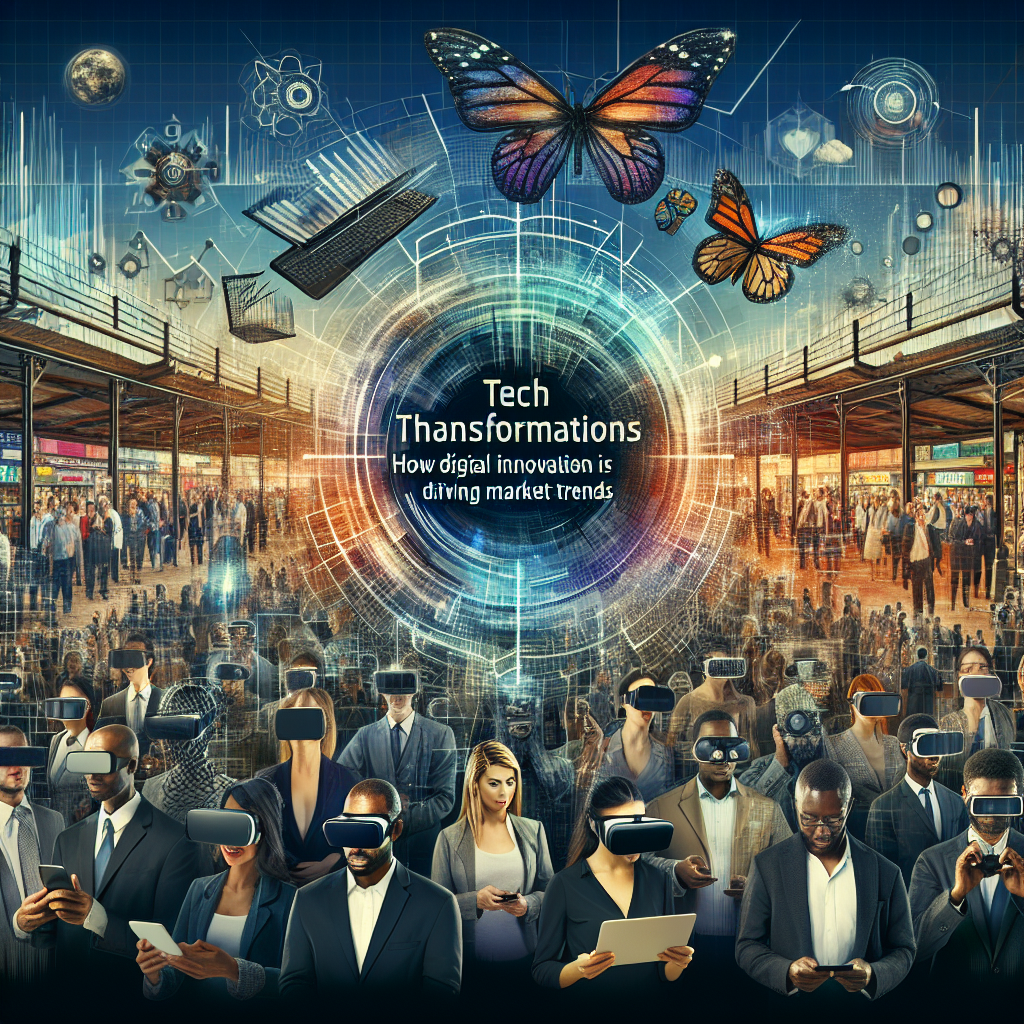In today’s fast-paced world, digital innovation has become a critical driver of market trends, reshaping how businesses operate and interact with consumers. The relentless advancement of technology has transformed industries, introduced new business models, and altered consumer expectations. These tech transformations are not merely trends—they are fundamental shifts that are reshaping the market landscape across all sectors. In this article, we will explore the facets of digital innovation, its impact on various industries, and the market trends emerging from these transformations.
The Essence of Digital Innovation
Digital innovation refers to the use of technology to develop new or improved processes, products, or services. It encompasses everything from leveraging data analytics and artificial intelligence (AI) to the adoption of cloud computing and the Internet of Things (IoT). The integration of these technologies enables organizations to enhance efficiency, improve customer experiences, and achieve competitive advantages.
Key Components of Digital Innovation
- Data Analytics: Utilizing big data to gain insights into customer behavior and market trends.
- Cloud Computing: Offering flexible access to computing resources and applications over the internet.
- AI and Machine Learning: Automating processes and decision-making through advanced algorithms.
- IoT: Connecting devices to collect and analyze data for improved operations.
- Blockchain: Providing secure and transparent transaction processes across industries.
Impact on Industries
Digital innovation is not industry-specific; it affects various sectors differently. Let’s delve into how specific industries are being transformed by technology.
1. Retail Industry
The retail industry has witnessed a seismic shift due to digital innovation. E-commerce platforms have reshaped consumer shopping habits, making online shopping a primary retail mode. Retailers are leveraging technologies like AI and machine learning for personalized marketing, inventory management, and customer service enhancement.
For instance, recommendation engines suggest products based on customer behavior, while chatbots offer instant support, improving customer satisfaction and driving sales.
2. Healthcare Sector
Technology has revolutionized healthcare through telemedicine, electronic health records, and AI diagnostics. Telemedicine provides remote consultations, increasing access to care, particularly in rural areas. AI can analyze vast amounts of data to assist in diagnosing diseases, leading to more accurate and efficient treatments.
Additionally, wearables and health monitoring devices enable continuous patient monitoring, resulting in proactive healthcare management.
3. Financial Services
Fintech is a prime example of how digital innovation is transforming the financial services sector. From mobile payment solutions to blockchain technology, digital platforms are enhancing transaction security and efficiency while improving customer experiences.
Robo-advisors are democratizing investment management by providing algorithm-driven financial planning with minimal human intervention, making investment accessible to a broader audience.
4. Manufacturing and Industry 4.0
Industry 4.0 represents the fourth industrial revolution characterized by the integration of smart technology into manufacturing processes. IoT and AI are driving efficiencies through predictive maintenance, allowing manufacturers to anticipate equipment failures and reduce downtime.
Furthermore, 3D printing is enabling more cost-effective and customized production, giving manufacturers greater flexibility. This transformation is also evident in supply chain logistics, where digital tools streamline operations and enhance visibility.
Emerging Market Trends Driven by Digital Innovation
The rapid pace of technological change has given rise to several noteworthy market trends that are indicative of future directions.
1. The Rise of Remote Work
The pandemic accelerated the adoption of remote work, a trend likely to persist. Companies are investing in digital collaboration tools and infrastructure to facilitate effective communication and performance management, encouraging a flexible workforce.
2. Sustainability Through Technology
Consumers are becoming increasingly conscious of sustainability. Technological innovations are aiding companies in reducing their carbon footprints, optimizing resource usage, and developing sustainable products. Digital tools are essential for tracking environmental impact and reporting on sustainability goals.
3. Enhanced Customer Experience
Businesses are leveraging digital technologies to create personalized and seamless customer experiences. From user-friendly websites to tailored marketing campaigns, digital innovations empower companies to meet consumer demands efficiently.
4. Health and Wellness Tech
The health and wellness sector is evolving due to a heightened focus on personal well-being. Apps and wearable devices are gaining popularity, offering consumers insights into their health, fitness, and wellness routines, reflecting a broader trend of health-conscious living.
Conclusion
Digital innovation is not just a passing trend; it represents a fundamental shift in how we interact with technology across all sectors. From retail to healthcare and finance, the impact of these tech transformations is profound and far-reaching. As businesses embrace digital change, understanding how these innovations shape market trends is crucial for staying competitive.
Organizations must continue to adapt by investing in new technologies and prioritizing customer-centric strategies. The ability to harness the power of digital transformation will be a key determinant of success in the evolving market landscape.
FAQs about Tech Transformations and Digital Innovation
What is digital innovation?
Digital innovation refers to the use of technology to develop new or improved processes, products, or services, enhancing efficiency and customer experiences.
How does digital innovation impact businesses?
It enables businesses to streamline operations, personalize customer interactions, and access new markets while fostering competitiveness.
What industries are most affected by digital innovation?
Industries including retail, healthcare, finance, and manufacturing have been significantly transformed by digital innovation.
What are some key trends in digital innovation?
Key trends include the rise of remote work, a focus on sustainability, enhanced customer experiences, and the growth of health and wellness technology.
Why is understanding tech transformations important?
Understanding tech transformations helps businesses adapt to market changes, meet customer expectations, and remain competitive in a rapidly changing environment.
#Tech #Transformations #Digital #Innovation #Driving #Market #Trends

